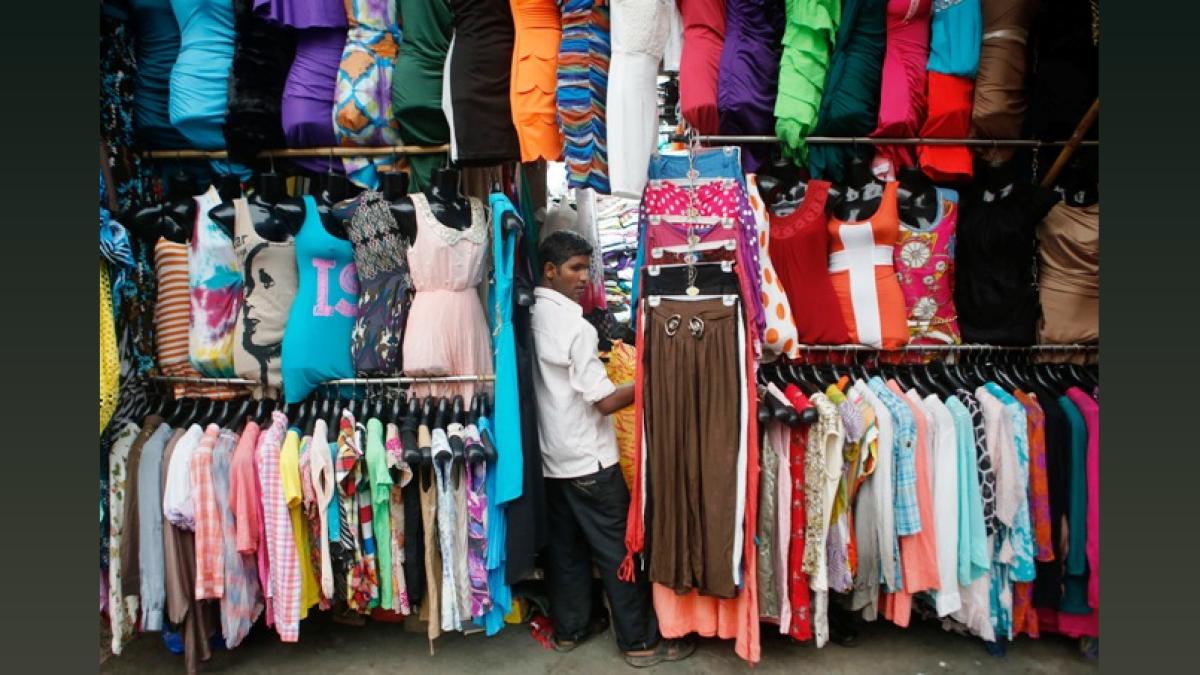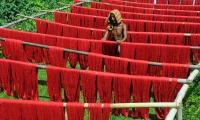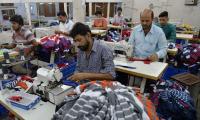Garment Export Growth Stunted: GTRI Highlights Hurdles
India's garment export growth is hindered by complex procedures, import restrictions, and domestic monopolies, according to GTRI. The think tank calls for a revamp of DGFT and Customs processes.

New Delhi, Jul 21 (PTI) Issues like complex procedures of DGFT and customs, import restrictions and domestic vested interests are holding up the export growth of the Indian garment sector, think tank GTRI said on Sunday.
At the root of the exporters' problem is difficulty in obtaining quality raw fabric, particularly synthetic fabric, the Global Trade Research Initiative said.
"Unlike in Bangladesh and Vietnam, where exporters easily access quality imported fabrics, Indian exporters struggle daily. High import duties on fabrics, coupled with DGFT (Directorate General of Foreign Trade) and Customs; intricate procedures, force exporters to meticulously account for every inch and type of fabric imported," GTRI founder Ajay Srivastava said.
He added that the imposition of mandatory quality norms on raw materials like polyester and viscose staple fibres is complicating imports as the BIS (Bureau of Indian Standards) slowly registers foreign suppliers, and this delay compels exporters to buy from domestic monopolies at higher prices.
A GTRI report alleged that the procedures of DGFT and customs are archaic, and it requires exporters to meticulously account for every square centimetre of fabric, buttons, and zippers used.
A complex maze discourages even the most enterprising exporters. So, there is an urgent need for a comprehensive overhaul, it said, adding that there is also a need to modify the production-linked incentive (PLI) scheme for the textiles sector.
On the procedures, it said that these issues create serious problems for industry players, and that needs to be resolved.
Citing examples, the report said the DGFT's import policy circular of 2001 requires that all imports of textiles must be accompanied by a Pre-shipment Inspection Certificate (PSIC) issued by a Textile Testing Laboratory accredited to the National Accreditation Agency of the supplier country.
This circular exempts imports for export purposes, yet Customs does not allow such imports without a PSIC and subjects all textile goods to mandatory compliance requirements for customs examination, causing tremendous stress on the clearance of shipments daily, it claimed, adding that all imports of textiles should be cleared based on self-declaration by the firms.
It also said firms obtain advance authorisations from DGFT for importing duty-free inputs for export production, and the directorate currently requires that unutilised authorisations surrendered to them must be accompanied by a non-utilisation letter/certificate from Customs.
"This requirement increases transaction costs and effort for the authorisation holder, and Customs is often reluctant to issue such letters, causing delays," the report said.
Further, the DGFT system allows up to 500 characters to describe export items in an authorisation, but the Customs Shipping Bill only allows 120 characters, so this discrepancy leads to incomplete descriptions being visible to DGFT.
"As a result, DGFT asks exporters to obtain attested invoices or shipping bills with full descriptions from customs, which customs does not entertain. Many firms have pending closures at DGFT due to this issue, despite completing both imports and exports," it said, suggesting that the customs to increase the character space in shipping bills.
It further urged the directorate to issue import entitlements in value terms like Bangladesh rather than looking into the actual consumption of the inputs.
"India should follow this system, as input consumption norms fixed by the DGFT are over 25 years old. Fashion changes frequently, affecting the consumption of fabric and other inputs, making old norms impractical," it said, adding that they must also allow additional wastage for advance authorisations if the design of a garment warrants it.
Raising another issue, it said the DGFT requires EPCG authorisation holders to submit an annual report on the fulfilment of their Export Obligation (EO) by June 30th each year. After submission, these reports need approval from DGFT.
Until the report is approved, the authorisation holder cannot make other requests, such as installing imported capital goods or closing the authorisation.
It also suggested to eliminate annual reporting as the directorate already receives details of every import/export shipment from ICEGATE, making annual reports redundant.
India's textile industry, valued at USD 250 billion, provides jobs to 50 million people. The sector is divided into three broad categories - Textiles (fibre, yarn, and fabrics); Garments and; Made-ups (Bed sheets, curtains etc.). India is present across all parts of the value chain.
In 2023, China exported USD 114 billion worth of garments, followed by the EU (USD 94.4 billion), Vietnam (USD 81.6 billion), Bangladesh (USD 43.8 billion), and India with just USD 14.5 billion.
From 2013 to 2023, Bangladesh's garment exports grew by 69.6 per cent, Vietnam's by 81.6 per cent, and India's by only 4.6 per cent.
"As a result, India's global market share in garment trade has declined from 2015 to 2022. The share of knitted apparel dropped from 3.85 per cent to 3.10 per cent, and the share of non-knitted apparel decreased from 4.6 per cent to 3.7 per cent," Srivastava said.
He said that the garment imports too surged by 47.90 per cent, from USD 1.06 billion in 2018 to USD 1.56 billion in 2023.
Textile imports also saw a notable increase of 20.86 per cent, from USD 5.77 billion to USD 6.97 billion.
At the root of the exporters' problem is difficulty in obtaining quality raw fabric, particularly synthetic fabric, the Global Trade Research Initiative said.
"Unlike in Bangladesh and Vietnam, where exporters easily access quality imported fabrics, Indian exporters struggle daily. High import duties on fabrics, coupled with DGFT (Directorate General of Foreign Trade) and Customs; intricate procedures, force exporters to meticulously account for every inch and type of fabric imported," GTRI founder Ajay Srivastava said.
He added that the imposition of mandatory quality norms on raw materials like polyester and viscose staple fibres is complicating imports as the BIS (Bureau of Indian Standards) slowly registers foreign suppliers, and this delay compels exporters to buy from domestic monopolies at higher prices.
A GTRI report alleged that the procedures of DGFT and customs are archaic, and it requires exporters to meticulously account for every square centimetre of fabric, buttons, and zippers used.
A complex maze discourages even the most enterprising exporters. So, there is an urgent need for a comprehensive overhaul, it said, adding that there is also a need to modify the production-linked incentive (PLI) scheme for the textiles sector.
On the procedures, it said that these issues create serious problems for industry players, and that needs to be resolved.
Citing examples, the report said the DGFT's import policy circular of 2001 requires that all imports of textiles must be accompanied by a Pre-shipment Inspection Certificate (PSIC) issued by a Textile Testing Laboratory accredited to the National Accreditation Agency of the supplier country.
This circular exempts imports for export purposes, yet Customs does not allow such imports without a PSIC and subjects all textile goods to mandatory compliance requirements for customs examination, causing tremendous stress on the clearance of shipments daily, it claimed, adding that all imports of textiles should be cleared based on self-declaration by the firms.
It also said firms obtain advance authorisations from DGFT for importing duty-free inputs for export production, and the directorate currently requires that unutilised authorisations surrendered to them must be accompanied by a non-utilisation letter/certificate from Customs.
"This requirement increases transaction costs and effort for the authorisation holder, and Customs is often reluctant to issue such letters, causing delays," the report said.
Further, the DGFT system allows up to 500 characters to describe export items in an authorisation, but the Customs Shipping Bill only allows 120 characters, so this discrepancy leads to incomplete descriptions being visible to DGFT.
"As a result, DGFT asks exporters to obtain attested invoices or shipping bills with full descriptions from customs, which customs does not entertain. Many firms have pending closures at DGFT due to this issue, despite completing both imports and exports," it said, suggesting that the customs to increase the character space in shipping bills.
It further urged the directorate to issue import entitlements in value terms like Bangladesh rather than looking into the actual consumption of the inputs.
"India should follow this system, as input consumption norms fixed by the DGFT are over 25 years old. Fashion changes frequently, affecting the consumption of fabric and other inputs, making old norms impractical," it said, adding that they must also allow additional wastage for advance authorisations if the design of a garment warrants it.
Raising another issue, it said the DGFT requires EPCG authorisation holders to submit an annual report on the fulfilment of their Export Obligation (EO) by June 30th each year. After submission, these reports need approval from DGFT.
Until the report is approved, the authorisation holder cannot make other requests, such as installing imported capital goods or closing the authorisation.
It also suggested to eliminate annual reporting as the directorate already receives details of every import/export shipment from ICEGATE, making annual reports redundant.
India's textile industry, valued at USD 250 billion, provides jobs to 50 million people. The sector is divided into three broad categories - Textiles (fibre, yarn, and fabrics); Garments and; Made-ups (Bed sheets, curtains etc.). India is present across all parts of the value chain.
In 2023, China exported USD 114 billion worth of garments, followed by the EU (USD 94.4 billion), Vietnam (USD 81.6 billion), Bangladesh (USD 43.8 billion), and India with just USD 14.5 billion.
From 2013 to 2023, Bangladesh's garment exports grew by 69.6 per cent, Vietnam's by 81.6 per cent, and India's by only 4.6 per cent.
"As a result, India's global market share in garment trade has declined from 2015 to 2022. The share of knitted apparel dropped from 3.85 per cent to 3.10 per cent, and the share of non-knitted apparel decreased from 4.6 per cent to 3.7 per cent," Srivastava said.
He said that the garment imports too surged by 47.90 per cent, from USD 1.06 billion in 2018 to USD 1.56 billion in 2023.
Textile imports also saw a notable increase of 20.86 per cent, from USD 5.77 billion to USD 6.97 billion.
You May Like To Read
TODAY'S MOST TRADED COMPANIES
- Company Name
- Price
- Volume
- Vodafone-Idea-L
- 11.16 (+ 4.01)
- 108106853
- Mangalam-Industrial
- 0.90 (+ 4.65)
- 39783652
- Welcure-Drugs-and
- 0.50 (+ 4.17)
- 38600310
- Alstone-Textiles
- 0.29 ( -3.33)
- 26516474
- Murae-Organisor
- 0.27 (+ 3.85)
- 25567040





